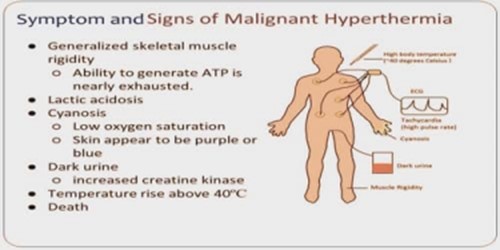Which manifestations would the nurse expect for a client with a history of malignant hyperthermia (MH)?
Select all that apply.
Dysrhythmias
Hypertension
Muscle rigidity of jaw and upper chest
Tachypnea
Skin mottling
High body temperature
Correct Answer : A,C,D,F
Muscle rigidity is a hallmark sign of malignant hyperthermia. It commonly affects the muscles of the jaw and upper chest.
Malignant hyperthermia can lead to rapid and shallow breathing, resulting in tachypnea. Malignant hyperthermia is characterized by a significant increase in body temperature, often exceeding 38.8°C (101.8°F).
Malignant hyperthermia can cause irregular heart rhythms or dysrhythmias, including tachycardia or arrhythmias.
The manifestations of hypertension and skin mottling are not typically associated with malignant hyperthermia. Hypertension (high blood pressure) is more commonly seen in conditions such as hypertensive emergencies or certain cardiovascular disorders. Skin mottling, which refers to irregular or patchy skin coloration, is not a specific manifestation of malignant hyperthermia.

Nursing Test Bank
Naxlex Comprehensive Predictor Exams
Related Questions
Correct Answer is B
Explanation
An increased serum potassium level, also known as hyperkalemia, can have adverse effects on the electrical conduction of the heart, potentially leading to life-threatening cardiac dysrhythmias. Therefore, it is crucial to assess the patient's pulse rate and rhythm promptly to identify any abnormal cardiac activity.
Assessing the oxygen saturation (oxygen stats), respiratory rate and depth, and deep tendon reflexes are also important assessments, but they are not the priority in this case. Hyperkalemia primarily affects cardiac function, and prompt identification of any potential cardiac rhythm disturbances is essential to prevent further harm.
Correct Answer is B
Explanation
Pain tolerance refers to the maximum level of pain that an individual can tolerate without significant distress. It is influenced by various factors, including psychological and emotional factors. While emotions such as anger, boredom, and introversion can have an impact on a person's pain perception and experience, sleep plays a significant role in pain tolerance. During sleep, the body is in a state of rest and relaxation, allowing for decreased sensory input and potentially reducing pain perception. Sleep provides an opportunity for the body to repair and heal, which can contribute to improved pain tolerance. Additionally, sleep promotes the release of endogenous opioids, which are natural pain-relieving substances produced by the body.
Whether you are a student looking to ace your exams or a practicing nurse seeking to enhance your expertise , our nursing education contents will empower you with the confidence and competence to make a difference in the lives of patients and become a respected leader in the healthcare field.
Visit Naxlex, invest in your future and unlock endless possibilities with our unparalleled nursing education contents today
Report Wrong Answer on the Current Question
Do you disagree with the answer? If yes, what is your expected answer? Explain.
Kindly be descriptive with the issue you are facing.
